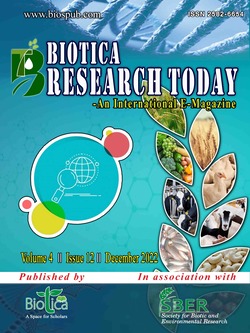
IMTA - An Evolution from Off Shore Aquaculture
S. Harini*
Dept. of Aquaculture, Dr. MGR Fisheries College and Research Institute, Ponneri, Tamil Nadu Dr. J. Jayalalithaa Fisheries University, Tamil Nadu (601 204), India
Mahadevi
Dept. of Aquaculture, Dr. MGR Fisheries College and Research Institute, Ponneri, Tamil Nadu Dr. J. Jayalalithaa Fisheries University, Tamil Nadu (601 204), India
Cheryl Antony
Dept. of Aquaculture, Dr. MGR Fisheries College and Research Institute, Ponneri, Tamil Nadu Dr. J. Jayalalithaa Fisheries University, Tamil Nadu (601 204), India
DOI: NIL
Keywords: IMTA, Integrated Aquaculture, Off shore practice, Sustainable practice
Abstract
The full potential of the aquaculture industry by intensive systems is not well utilized due to its drawback in the environment and ecosystem. It is necessary to find out the solution which brings out the immense potential of the aquaculture industry to meet the demand of the future. The off shore aquaculture which is 2-3 kms away from the coastline requires less land and freshwater with smaller carbon footprint. It also has an advantage of minimal flow of water which protects the water quality. But the problem is that it has to be robust, independent and affordable. The making of this system is relatively more expensive and heavy materials are used which makes handling and maintenance difficult. To overcome the economic drawbacks, the Integrated Multi Trophic Aquaculture (IMTA) system is evolved from off shore aquaculture which reduces the overall economy of the system by reduction of amount of feed given, minimizing energy losses and the product diversification which provides higher economic yield.
Downloads
not found
Reference
Buck, B.H., Troell, M.F., Krause, G., Angel, D.L., Grote, B., Chopin, T., 2018. State of the art and challenges for offshore integrated multi-trophic aquaculture (IMTA). Frontiers in Marine Science 5, 165.
Chopin, T., Cooper, J.A., Reid, G., Cross, S., Moore, C., 2012. Open-water integrated multi-trophic aquaculture: environmental biomitigation and economic diversification of fed aquaculture by extractive aquaculture. Reviews in Aquaculture 4(4), 209-220.
Ridler, N., Wowchuk, M., Robinson, B., Barrington, K., Chopin, T., Robinson, S., Page, F., Reid, G., Szemerda, M., Sewuster, J., Boyne-Travis, S., 2007. Integrated multi-trophic aquaculture (IMTA): a potential strategic choice for farmers. Aquaculture Economics & Management 11(1), 99-110.
Troell, M., Joyce, A., Chopin, T., Neori, A., Buschmann, A.H., Fang, J.G., 2009. Ecological engineering in aquaculture-potential for integrated multi-trophic aquaculture (IMTA) in marine offshore systems. Aquaculture 297(1-4), 1-9.
